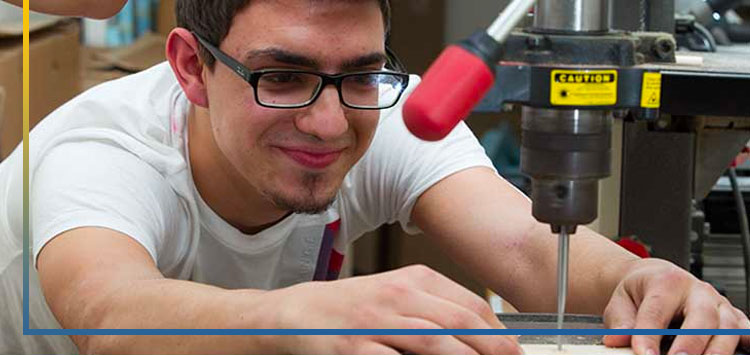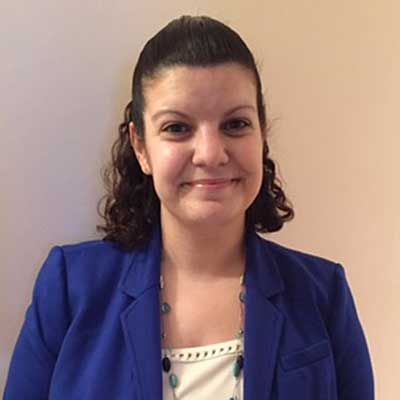
Michelle Albanese
Manager, Financial Operations
Long Island Jewish Medical Center (Northwell Health)
Why did you decide to come to Hofstra and study engineering?
I am a native Long Islander. My mother is a teacher and my father is an industrial engineer. I think some of that must be genetic because, from the time I was young, I have been fascinated by figuring out how things work. By the time I was in high school, I knew I wanted to be an engineer. When the time came to decide where to go to college, walking through Weed Hall just felt like the right fit for me. My father and several family friends are also Hofstra Engineering alumni and it was a bonus to continue that tradition. We were all privileged to take classes with Dr. Ronald Alvarez, who recently retired after a long and distinguished career in the Hofstra Engineering department. Dr. Alvarez is a legend in my family! I loved my time at Hofstra and it quickly became my second home and I decided to stay on to pursue my MBA.
Tell us how you began your career at Northwell.
I began my career with Northwell Health in 2009 and have been with them ever since. I was in their Corporate Finance department for about 6.5 years. Last June, I transitioned to a new position within the Health System at Long Island Jewish Medical Center, which is part of Northwell Health and I am now the Manager of Financial Operations. My responsibilities include financial analysis, business planning, forecasting, capital planning, and budgeting for the facility. I also work with our clinical and non-clinical departments to assist them in their financial planning – everything from staffing to supply utilization to potential revenue opportunities.
How did engineering help you prepare for your career?
The most important thing that I took away from my engineering education was how to analyze a problem and think critically. It really showed me the importance of focus and attention to detail. Those lessons are applicable to any industry or role. Even though I am not in a traditional industrial engineering role, I still approach my work with that engineering mindset.
Was there a professor or mentor at Hofstra who inspired you as an undergraduate?
I was fortunate to have several influential professors during my time at Hofstra. First and foremost was Dr. Richard Puerzer who was my advisor. Dr. Puerzer is one of the best and most supportive teachers I have ever had. His door was always open for me to talk to him about my studies, what classes I should take the next semester, challenges and concerns with my Senior Design project, what to do about graduate school and my career. After taking Engineering Economics with Dr. Puerzer, I decided that industrial engineering was the path I wanted to pursue and officially declared it as my major. He has had a huge impact on my life and I am forever grateful.
Dr. Gerda Kamberova in the Computer Science department is a terrific example of a successful woman in a STEM field. She has such a passion for her work and teaching and it is contagious. Dr. Kamberova is also extremely encouraging and supportive of women in STEM fields and is a terrific resource for female students.
Was there an “aha!” moment when you discovered your career path?
After I graduated with my MBA, I didn’t have a clear idea of what field I wanted to enter. The economy had also really slowed to a crawl at that point and jobs were scarce. I hadn’t really considered healthcare as a career option when I first started applying for jobs. Once I got started in the industry though, I realized just how much opportunity there was for someone with my background. The healthcare industry is evolving at such a rapid pace driven primarily by scientific and technological change. Unfortunately, the processes and systems being used are not evolving at the same pace. That is where an industrial engineer can make a significant impact.
What career advice do you have for current students?
I have three pieces of advice for those about to start their careers:
The first is that learning cannot stop once you graduate. Set a goal to learn something new each day, whether in your professional or personal life. This can be as simple as keeping current with industry news or as challenging as teaching yourself a new skill. Particularly for those in STEM fields, advancements and changes happen so rapidly that you can easily fall behind. Be diligent in in pursuing professional development opportunities, explore areas that interest you, and do whatever you can to keep growing your knowledge base. Don’t limit yourself to purely technical areas of expertise and fall into the typical engineer stereotype – being well-rounded is key.
The second piece of advice is a lesson I learned early on from my dad. “Don’t come to me with a problem, come to me with a solution.” In your career, wherever you are, what will set you apart is your ability to analyze the issues and make recommendations to solve or mitigate problems. As engineers, we have learned how to do just that – we know how to identify the constraints, we know how to analyze and interpret the data, and we know how to evaluate the various impacts. We design, we build, we test, and we go back to the drawing board when necessary. This skillset is extremely valuable—don’t be afraid to apply these skills no matter what industry or role you are in.
Finally, make a name for yourself for the right reasons. Work ethic is so important. Walk in the door each day with the right attitude and be engaged. Attention to detail is absolutely necessary. Approach each report, analysis, or presentation you prepare as if it will end up on your CEO’s desk. Effective and frequent communication is crucial and you need to be able to explain technical details in way that is easily understood by technical and non-technical people alike. Don’t be afraid to ask questions.
What advice do you have for women interested in STEM fields?
There is never a bad time for women to enter STEM fields and we need to continue to reinforce that message. I came to Hofstra and there were only a handful of women in my year in the engineering program. You can’t let the numbers intimidate you. If engineering or science or math is your passion, then pursue it. Your effort and drive will speak louder than your gender any day. As women, we need to do a better job of supporting, encouraging, and mentoring each other. I have been extremely fortunate to have strong female role models in my life – from my mother to my teachers to my supervisors. I am encouraged by the changes I see in younger generations. My high school now has a robotics team and was the only all-female team to compete this year at the FIRST Robotics competition. This progress and growth is so inspiring and we need to continue getting girls interested in STEM fields from an early age.
What career trends do you see for engineering students in healthcare?
Healthcare is a rapidly changing and complex industry. In the almost 8 years I have been here, there has been a significant change in how care is delivered and how we develop and manage the relationship with our patients.
Within Northwell, there are roles for engineers of all specialties. We have biomedical engineers working in research roles as well as in the hospitals managing various equipment and technology. We have mechanical and civil engineers who are involved with a multitude of construction projects from designing a new humidification system for LIJ’s 24 operating rooms to creating the plans to convert a former supermarket into a state-of-the-art outpatient cancer treatment center. In addition to Finance, we have industrial engineers in Hospital Administration, various Service Lines (Cardiothoracic Surgery, Anesthesiology, Otolaryngology), the Office of Patient and Customer Experience, IT, and Clinical Transformation and Evidence Based Practice.
It is proof of just how valuable and important the engineering skillset is.

Hofstra University
BS in Industrial Engineering with Honors College designation and a minor in mathematics, 2006
MBA Finance, 2008